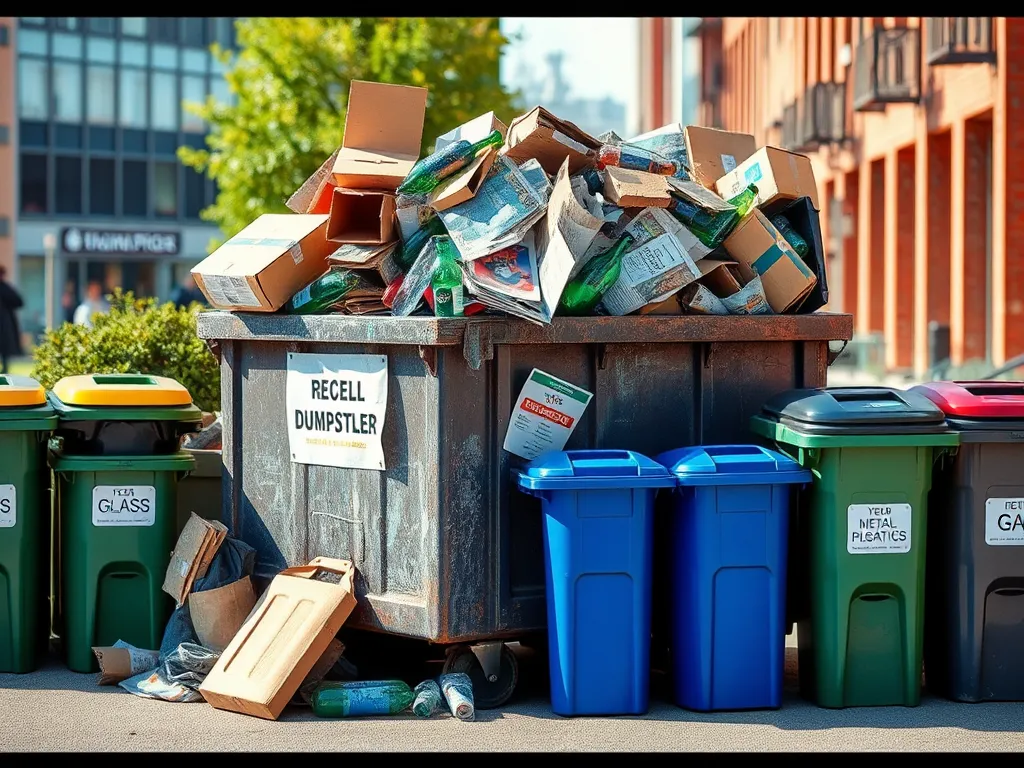What Are Allowed Dumpster Items? A Complete Guide

Your Guide to Allowed Dumpster Items
When it comes to cleaning up your space, whether during a home renovation or a spring cleaning, knowing the allowed dumpster items is crucial. Dumpsters provide a convenient way to dispose of waste efficiently, but not all items can be tossed in. Understanding what you can and cannot dispose of will save you time, money, and potential legal issues. In this guide, we will outline what you can put in a dumpster and provide specific details on different categories of waste.
Allowed dumpster items generally include a variety of household items and construction debris. It’s important to check with your local waste management service, as specific regulations may vary by location. In general, allowed dumpster items can encompass old furniture, appliances, certain electronics, and general debris from home improvement projects. However, there are also prohibited items that you need to be aware of to avoid fines or penalties.
Household items, due to their volume and nature, are commonly cleared out using dumpsters during large cleanouts. Furniture pieces like couches, chairs, and tables are often permitted, along with household appliances such as refrigerators, washing machines, and microwaves. However, electronics and items containing hazardous materials have specific guidelines that also dictate what can be placed in a dumpster, making it essential to understand these rules clearly.
Construction debris poses additional considerations since larger projects often involve a significant amount of materials. Allowed dumpster items in construction usually include debris from roofing, drywall, and insulation, assuming these materials are non-hazardous. Landscaping waste can also be included, provided it adheres to the specific guidelines of your disposal service. Furthermore, commercial waste from businesses or events must adhere to local regulations, which can often dictate what types of waste can be disposed of in commercial dumpsters.
Finally, recycling and composting efforts should also guide your choices regarding allowed dumpster items. Many recyclable materials, such as metals, plastics, and cardboard, should be separated from regular waste. Compostable items can be part of your overall waste strategy, minimizing landfill contributions. By ensuring proper disposal arrangements for both recyclable and organic materials, you can contribute positively to environmental sustainability while adhering to local disposal regulations.
Household Items
When disposing of furniture, you can typically toss items like sofas, tables, chairs, and mattresses in a dumpster. However, check local regulations, as some areas have restrictions on items contaminated with mold or hazardous substances.
Common household appliances allowed in dumpsters include refrigerators, stoves, washing machines, and microwaves. Ensure that these items do not contain hazardous components like Freon, as special disposal might be required.
Electronics are often subject to specific disposal guidelines. While many places allow basic electronic devices such as televisions and computers in dumpsters, others require them to be taken to electronic recycling centers due to the presence of hazardous materials.
Understanding what items are accepted can help you maximize efficiency when disposing of waste, so check out 'What Can I Throw in a Recycle Dumpster?'.
Hazardous materials, such as paint, chemicals, and batteries, should never be disposed of in dumpsters. They pose environmental risks and can lead to fines or legal issues, so it’s crucial to understand what items to avoid.
Construction Debris
Construction debris that you can throw in your dumpster includes materials like wood, bricks, concrete, and metal scraps. Make sure the debris does not contain hazardous substances or contaminants that can affect waste processing.
When dealing with drywall and insulation, proper disposal methods vary based on the material’s composition. Ensure you understand the requirements for disposing of these items, as they may be treated differently compared to general construction debris.
For roofing materials, it's essential to identify what can be disposed of in dumpsters. Asphalt shingles are typically allowed, but tiles and materials containing asbestos are prohibited and require special handling.
Landscaping waste such as branches, shrubs, and grass clippings can usually be dumped in a dumpster, depending on the specific regulations in your area. However, it's important to ensure that these items are free from contamination, like soil or other waste.
Commercial Waste
Understanding the regulations surrounding business waste disposal is essential for any company engaging in renovations or cleanup. Many local councils have specific guidelines for managing commercial waste due to its increased volume and potential environmental risks.
Accepted items for commercial renovations and cleanouts typically include furniture, old equipment, and general debris. However, it's essential to check local rules for any specific restrictions regarding contaminated materials.
For events, disposable items like banners, promotional materials, and food waste may be eligible for dumpster disposal. However, check local guidelines to ensure compliance with health and safety regulations, especially concerning food waste.
Compliance with local disposal laws is critical for businesses. Not adhering to these laws can lead to fines or penalties, so staying informed about your local regulations is a necessary part of waste management.
Recycling and Composting
Many items that can be recycled, such as paper, glass, metals, and certain plastics, can often be removed from dumpsters rather than thrown away. Ensure to check with local recycling centers for guidance on what materials can be recycled.
Guidelines for compostable organic waste include items such as vegetable scraps, coffee grounds, and yard waste. It’s important to separate compostable items from regular waste to minimize landfill contributions.
The separation of recyclables is crucial. Improper disposal can contaminate the recycling stream and lead to increased costs and wasted materials, so it's vital to know how to separate these items properly before disposal.
Common mistakes in dumpster disposal include placing prohibited items in the dumpster or mixing recyclable materials with non-recyclables. Awareness of these issues can help you avoid potential penalties and adhere to best practices.
Prohibited Items
Banned materials typically include hazardous wastes like chemicals, batteries, asbestos, medical waste, and electronic devices. Always check local regulations for a complete list of prohibited items.
Consequences of improper disposal may include fines, legal action, and additional disposal costs. It’s essential to familiarize yourself with the rules to protect yourself from potential liabilities and ensure environmental responsibility.
Alternatives for hazardous waste disposal often include designated drop-off centers or special collection events organized by local municipalities to help handle these items safely.
Local regulations and compliance guidelines can vary widely depending on your location. Stay informed about the specific rules that govern waste disposal in your area to ensure all your actions remain within legal boundaries.
